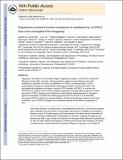Rapamycin-Induced Insulin Resistance Is Mediated by mTORC2 Loss and Uncoupled from Longevity
Author(s)
Lamming, Dudley W.; Ye, Lan; Katajisto, Pekka; Goncalves, Marcus D.; Saitoh, Maki; Stevens, Deanna M.; Davis, James G.; Salmon, Adam B.; Richardson, Arlan; Ahima, Rexford S.; Guertin, David A.; Baur, Joseph A.; Sabatini, David; ... Show more Show less
DownloadSabatini_Rapamycin-induced.pdf (797.4Kb)
PUBLISHER_POLICY
Publisher Policy
Article is made available in accordance with the publisher's policy and may be subject to US copyright law. Please refer to the publisher's site for terms of use.
Terms of use
Metadata
Show full item recordAbstract
Rapamycin, an inhibitor of mechanistic target of rapamycin complex 1 (mTORC1), extends the life spans of yeast, flies, and mice. Calorie restriction, which increases life span and insulin sensitivity, is proposed to function by inhibition of mTORC1, yet paradoxically, chronic administration of rapamycin substantially impairs glucose tolerance and insulin action. We demonstrate that rapamycin disrupted a second mTOR complex, mTORC2, in vivo and that mTORC2 was required for the insulin-mediated suppression of hepatic gluconeogenesis. Further, decreased mTORC1 signaling was sufficient to extend life span independently from changes in glucose homeostasis, as female mice heterozygous for both mTOR and mLST8 exhibited decreased mTORC1 activity and extended life span but had normal glucose tolerance and insulin sensitivity. Thus, mTORC2 disruption is an important mediator of the effects of rapamycin in vivo.
Date issued
2012-03Department
Massachusetts Institute of Technology. Department of Biology; Whitehead Institute for Biomedical Research; Koch Institute for Integrative Cancer Research at MITJournal
Science
Publisher
American Association for the Advancement of Science
Citation
Lamming, D. W., L. Ye, P. Katajisto, M. D. Goncalves, M. Saitoh, D. M. Stevens, J. G. Davis, et al. “Rapamycin-Induced Insulin Resistance Is Mediated by mTORC2 Loss and Uncoupled from Longevity.” Science 335, no. 6076 (March 29, 2012): 1638-1643.
Version: Author's final manuscript
ISSN
0036-8075
1095-9203